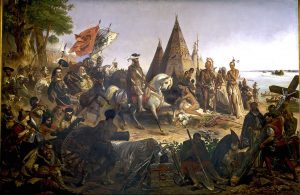The Indian Act of 1876 is a interesting event in Canadian history for multiple reasons. The Indian Act has put a considerable strain on native americans and it has bound them to a brutal contract which has not been two sided. The Indian act when it first was brought to Canada was a system that denied womans rights, introduced mandatory residential schools and had literally hundreds of clauses that held the average native american in a position with very little options. There were clauses in the Act that were barbaric and completely ridiculous such as denying the Native to speak their own language. The reality is that the beginning of the Indian Act treated aboriginal people like second class citizens that had few to no rights and their ability to be an active part of society was impossible unless they rejected their background and heritage. Either way Native Americans today are still suffering from the laws that this Act brought about. This is evident in the reserves that are across Canada today where native americans are often plagued with unrest and social issues that are directly correlated to the Indian Act of 1876. What is interesting is the lack of knowledge on what the Indian Act actually did and how it is being dealt with today? An article written by CBC stating “21 things you may not know about the Indian act” highlights many unknown realities of what the Indian Act actually enforced. There are still so many elements of the Indian Act that need to change and it evidences itself in how aboriginal are treated today. The Indian Act was a terrible way of trying to make native americans reject their heritage and infiltrate into society. Different methods were used to categorize native americans such as reserves. What is evident is that there are many elements of this Act that are discriminatory and racist? Why the Indian Act has not been abolished is a well debated topic and clearly controversial. The reality is that the Indian Act has been improved since 1876 and does provide certain rights to the native american that are beneficial. Yet the damage that the Indian Act has done is evident when considering all of the social issues that often are prevalent in native reserves. For example poor education standards, lack of opportunities, poor healthcare, and no to little social justice. These are just some of the issues that continually haunt native communities and the injustice needs to stop. One of the social issues that I personally am most passionate about is education rights for native communities. Realizing the need and putting in the time is essential at this time in order to make a difference. As Thomas-Muller states we need to see the “incredible potential of indigenous youth.” (APTN National News) Unless we give these communities the education they deserve change cannot come. Recognizing that many do not have the opportunities to go and pursue higher education and their world is therefore very small and confined. We also often ignore the damaging effect that the residential school system had on the education and lives of native groups. Residential schools were designed to destroy the ‘Indian’ way of life. The results of the residential schools led to many issues such as an increased rate of suicide and an epidemic of drugs and alcohol often used as a coping mechanism. These social issues are effecting natives today and is one of the number one reasons the school system is of number one priority. My findings on the Indian Act of 1876 do support Colemans research and statements in “White Civility” in that the Indian Act was based on British superiority and white civility. The Indian Act was born out of a time period that believed in white superiority and quite simply a racist way of viewing the world.
Works Cited
Joseph, Bob. “21 Things You May Not Know about the Indian Act – Indigenous – CBC.”CBCnews. CBC/Radio Canada, 2016. Web. 06 Dec. 2016.
Plewes, Cathy T. Ann. “First Nations, the Church, State, and Image: Policy and Ideals Reflected in the Indian Act of 1876.” Order No. MQ22099 Carleton University (Canada), 1997. Ann Arbor: ProQuest. Web. 6 Dec. 2016.
“The Residential School System.” The Residential School System. N.p., n.d. Web. 06 Dec. 2016.
“Top 5 Indigenous Issues All Canadians Should Care about – APTN National News.” APTN National News. N.p., 2015. Web. 06 Dec. 2016.
CanLit Guides. “Reading and Writing in Canada, A Classroom Guide to Nationalism.” Canadian Literature. Web. April 4th 2013.



